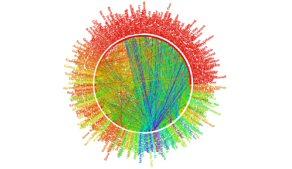| The value of connections | 2007-11-08 01:49 10 comments |
 by Flemming Funch by Flemming FunchFine Article at World Changing by Jon Lebkowsky about social networks and the value of connections. I'll excerpt a good explanation of some of the basics for discussing that: The conversation about social network value starts with a couple of assertions, or "laws," that have influenced the evolution of both technical and social networks:I think it is important to stress that we're talking about the potential value of a network. Just because you can call everybody in the world on the phone doesn't mean that you will or that much will come out of it. There's lot more potential there than if you didn't have phones, of course. But even in a vast network where one can form groups and collaborate, the actual value is a small fraction of the potential value. I'm a member of a lot of groups in places like Facebook, a bunch of which sound great, are along the lines of things I'm very interested in, and that are populated by people I like. And yet I rarely visit them, and not much comes out of it. There are a lot of bottlenecks that limit network value. Bandwidth issues, and lack of ways of organizing stuff. I have no great way of processing huge amounts of information because I don't have time to figure out what to do with it, and even though there is too much, there is also too little, so I don't necessarily perceive my connection with it, or the relevance for me. There's of course Dunbar's Number, which says that one can only maintain a meaningful social relationship with 150 people at the same time. There's that we can only keep our conscious attention on 5-7 things at the same time. And there's that computers don't help us much in overcoming such attention limits, even though they potentially could. Software does help us keep track of more things at the same time, and more things that are dispersed around the world in different places and different fields. And software does help me pay attention. But it just as much scatters my attention. There's a lot of software that hasn't been invented yet, which usually appears in science fiction, where one has some kind of symbiotic relationship with a computer and network, which makes us smarter, staying conscious of more stuff. But it doesn't really have to be in the form of a metaphysical merging with some big Singularity AI thing. Somebody has to write the software, and they could potentially do so now. We could get closer to the potential value of a network if I could see more of it. Even though the phone network is a relatively "simple" to understand network, I can't see it, I can't perceive it. I can see it like I can see the world through a keyhole. I can call one number at a time, or maybe two if I have call waiting, or a few dozen in a conference call. But nothing close to the few billion numbers there really are. I can get a list of people to call from a phonebook, a big stack of paper, sorted alphabetically, covering only a small geographical region. I can get much more online, but I can still only see it a limited number of ways, and organized by place, name and business. I can't really see the potential. I can see much more in online social networks, like people's pictures, their interests, their activities, where they go, what they do, who they know. At least to a certain extent. If I already know them well, it might be enough to stay connected in a useful way. If I don't, it might still be like the difference between a travel brochure and the actual journey. The brochure might have feeds and videos, but I'm still not there. My computer screen is still like a keyhole. In some kind of idealized future cyberspace everything will be connected and all information will be cross-indexed and we'll have access to in a computer-assisted way. Hopefully, when we figure out how. We can demonstrate some of it on a relatively small scale, and it is available if we put our mind to it. If I've read a book, and I no longer need it, I might be happy to give it away or exchange it with somebody else for another book which I might like to read, and which that person no longer needs. There are websites that will let you do exactly such an exchange. But you have to really decide that it is important, and to join it, sign up, type in the books you have available, mail them, etc. I'd of course want it to be more automatic, and thoroughly optimized. It would be easier if it were a person a couple of streets away who wanted my book, and easier if I didn't have to first join a website and type in the information about it. The potentially exponential value of a network comes about only if all information is linked up. If I can always find the very best information available, and the exact best people to work with, and the exact right time to do stuff, everything changes, of course. The Internet didn't yet magically make that happen, even if we suspected that maybe it would. So, how can we connect more, with more people? How can we use social software to get us beyond more of the limitations we're still taking with us from the non-wired world. I.e. how many things or how many people we can keep track of at one time. Connections will become more valuable if they can produce value even when I'm not paying attention to them. Paying attention, even when I'm not paying attention. Staying connected even when I don't connect. |